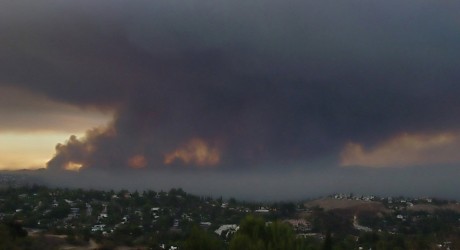Air pollution has long been known to cause heart and lung diseases, but new evidence published by the World Health Organization (WHO) suggests it has become the single biggest environmental health risk. This equates to one in eight of total deaths or about 7 million deaths each year.
The new finding more than doubles previous estimates and demonstrates how reducing indoor and outdoor pollution could save millions of lives in future, the United Nations health agency said.
In particular, the new data revealed a strong link between fumes from indoor stoves and high mortality rates. Approximately 61 per cent of air pollution-related deaths in 2012 occurred in households that cooked over coal, wood and biomass stoves.
WHO also noted that many people are exposed to both indoor and outdoor air pollution simultaneously. Outdoor air pollution from urban and rural sources resulted in approximately 3.7 million deaths in 2012.
The main sources of outdoor air pollution were found to be from industries such as power stations, emissions from agriculture, and burning rubbish. Fossil fuel emissions from cars and trucks have also skyrocketed in recent years with rapid urbanization and the increased reliance on motorized transport of people and goods.
Last year, WHO’s cancer agency classified air pollution as a carcinogen – placing it in the same category as tobacco smoke, UV radiation and plutonium. In the new report, WHO noted that women and children were at the highest risk of being exposed to carcinogenic air pollution.
“Poor women and children pay a heavy price from indoor air pollution since they spend more time at home breathing in smoke and soot from leaky coal and wood cook stoves,” described Dr Flavia Bustreo, WHO Assistant Director-General Family, Women and Children’s Health.
Air pollution allows tiny particles to get deep into the lungs and cause inflammation. Scientists suspect this inflammation is to blame for the increasing rates of noncommunicable diseases such as strokes and ischaemic heart disease, cancer, as well as acute respiratory infections and chronic obstructive pulmonary diseases.
“The risks from air pollution are now far greater than previously thought or understood, particularly for heart disease and strokes,” says Dr Maria Neira, Director of WHO’s Department for Public Health, Environmental and Social Determinants of Health.
“Few risks have a greater impact on global health today than air pollution; the evidence signals the need for concerted action to clean up the air we all breathe.”
Cleaning up the air that we breath is not a simple task. It is estimated that 2.9 billion people live in homes using wood, coal or dung as their primary cooking fuel.
“Excessive air pollution is often a by-product of unsustainable policies in sectors such as transport, energy, waste management and industry. In most cases, healthier strategies will also be more economical in the long term due to health-care cost savings as well as climate gains,” says Dr Carlos Dora, WHO Coordinator for Public Health, Environmental and Social Determinants of Health.
Urbanisation and rapidly growing cities has also increased exposure to air pollution and other poor-lifestyle related habits. Poor-lifestyle habits such inadequate diet, being physically inactive, excessive stress, and consuming substances of abuse such as alcohol and tobacco have multiplied the effects of air pollution in urban centres.
Poverty – a key determinant of health – is also growing faster in urban areas. Urban slums are typically overcrowded, polluted and dangerous, and lack basic services such as clean water and sanitation.
To help address this significant problem, WHO is expected to release indoor air quality guidelines on household fuel combustion as well as country data on outdoor and indoor air pollution exposures and related mortality.
Dr Couillard is an international health columnist that works in collaboration with the World Health Organization’s goals of disease prevention and control. Views do not necessarily reflect endorsement.
Facebook: Dr Cory Couillard
Twitter: DrCoryCouillard














